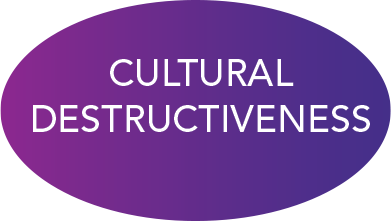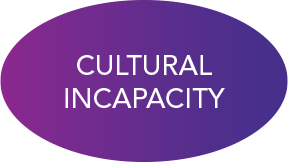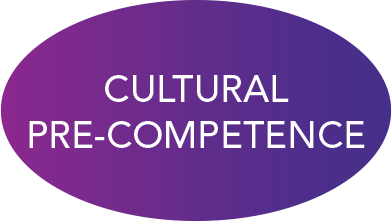
Chapter 2: Barriers and Challenges to Recruiting and Retaining Diverse Faculty
ADEA Humanistic Initiatives
- Chapter 1: Introduction
- Chapter 2: Barriers and Challenges to Recruiting and Retaining Diverse Faculty
- Chapter 3: Best Practice Highlights—Recruiting and Hiring Diverse Faculty
- Chapter 4: Best Practice Highlights—Retaining Diverse Faculty
- Chapter 5: Conclusion
- Appendix B: Diversity and Inclusion Terminology
In developing and implementing campus strategies to recruit and retain diverse faculty, dental educators must identify related barriers and challenges in order to develop initiatives and best practices to eliminate these obstacles. Additionally, studies note that people are more attracted to people like themselves, and are more likely to offer positions to persons with whom they feel most comfortable. On many campuses, this has resulted in a homogenous faculty in which women, individuals with disabilities, historically underrepresented racial/ethnic groups and the LGBTQIA+ community are disproportionally underrepresented in postsecondary faculty and academic leadership positions.
Additionally, to recruit and retain a more diverse and pluralistic faculty, postsecondary education, including academic dentistry, must move beyond traditional hiring practices and commit to removing barriers to inclusion. This requires an examination of key challenges and barriers in dental schools and allied dental programs that are resistant to change, an investment in greater resources and a thorough evaluation of recruitment and retention practices.
Tips on using the online toolkit:
- Use the links to navigate to topics of interest and/or download the ADEA Faculty Diversity Toolkit PDF.
- Read the “Chapter Key Points” section for key summaries of the chapter.
Chapter 2 Sections
- The Faculty Pipeline Challenge
- Chilly Climate, Biases and Myths
- Search Committees and Hiring
- Promotion, Tenure and Professional Development
Chapter Key Points
Research shows that people are more attracted to individuals like themselves and hire individuals with whom they believe they will be more comfortable. At most college campuses, this has resulted in a more homogenous faculty.
There is a link between the ability to successfully recruit and retain diverse faculty in academic dentistry and the recruitment, retention and graduation of diverse students in dental education.
Most dental school and dental hygiene faculty come from private practice.
Dental education and academic dentistry compete with other professions, such as medicine, engineering, technology and the corporate sector, for students with STEM competencies.
Because it is impossible for any one person to be familiar with all cultures and related perspectives, cultural competency is not a fixed point, but requires that individuals are fluid and adaptable as we learn about more culture and cultural change.
► Figure1. Cultural Competence Continuum
 | . . . the elimination of other cultures. It is represented by attitudes, policies and practices destructive to a culture and consequently, to the individuals within that culture. It includes efforts to seek to eliminate references to the culture of “others” in all aspects of education and in relationship with their communities. |
 | |
 | . . . the belief in the superiority of one’s culture and behavior that disempowers another’s culture. Represented by ethnocentrism and extreme bias, this stage assumes a paternal posture toward groups that the individual(s) views as “lesser than” and is marked by a lack of knowledge of other cultures. It also means trivializing “other” communities and seeking to make them appear to be wrong. |
 | |
 | . . . acting as if cultural differences do not matter or is marked by an inability to recognize differences between cultures. It is represented by the intent not to discriminate by avoiding making an issue of the differences between individuals. It also involves pretending not to see or acknowledge the status and culture of marginalized communities and choosing to ignore the experiences of such groups within the school and community. |
 | |
 | . . . an awareness of the limitations of one’s skills or an organization’s practices when interacting with other cultural groups. It also encompasses being increasingly aware of what you and your campus do not know about working with marginalized communities. It is at this key level of development that you and your campus can move in a positive, constructive direction—or you can vacillate, stop and probably regress. |
 | |
 | . . . interacting with other cultural groups using guidelines that focus on individual behaviors and practices, acceptance and respect for differences, ongoing assessment of campus culture, attention to the dynamics of difference, continuous expansion of cultural knowledge and resources and the adaptation of values and behaviors in a culturally competent framework. It involves manifesting your personal values and behaviors and the campus’ policies and practices in a manner that is inclusive with marginalized cultures and communities that are new or different from your own or the campus’. |
 | |
 | . . . knowing how to learn from other cultures, interacting effectively in a variety of cultural environments and, for leaders, taking opportunities to increase formal awareness of other cultures and the dynamics of difference. It involves advocating for lifelong learning in order to be increasingly effective in serving educational needs of the cultural groups. It also involves envisioning that you and other educators and community leaders are responsible for creating a socially just democracy. |
Sources: Adapted from Sparks Policy: The Engaging Nontraditional Voices Toolkit: The Cultural Proficiency Continuum.http://tools.sparkpolicy.com/wp-content/uploads/2015/01/Cultural-Proficiency-Continuum1.pdf. Accessed January 4, 2020; Lindsey RB, Nuri Robins K, & Terrell RD. Cultural proficiency: A manual for school leaders (2nd ed.). Thousand Oaks, CA: Corwin, 2003; Lindsey RB, Nuri Robins K, & Terrell RD. Cultural proficiency: A manual for school leaders (3rd ed.). Thousand Oaks, CA: Corwin, 2009; Toward a culturally competent system of care. Washington, DC: Georgetown University Child Development Program. 1989
► Figure2. The Camphinha-Bacote Process Model of Cultural Competence in the Delivery of Health Care Services
Cultural Awareness | “The self-examination and in-depth exploration of one’s own cultural and professional background. This process involves the recognition of one’s biases, prejudices, and assumptions about individuals who are different.” (Leininger, 1978) |
Cultural Knowledge | “The process of seeking and obtaining a sound educational foundation about diverse cultural and ethnic groups. In obtaining this knowledge base, the health care provider must focus on the integration of three specific issues: health-related beliefs and cultural values, disease incidence and prevalence, and treatment efficacy.” (Lavizzo-Mourey, 1996) |
Cultural Skill | The ability to collect relevant cultural data regarding the client’s presenting problem as well as accurately performing a culturally based physical assessment. This process involves learning how to conduct cultural assessments and culturally based physical assessments. |
Cultural Encounter | The process that encourages the health care provider to directly engage in cross-cultural interactions with clients from culturally diverse backgrounds. Directly interacting with clients from diverse cultural groups will refine or modify one’s existing beliefs about a cultural group and will prevent possible stereotyping that may have occurred. |
Cultural Desire | The motivation of the health care provider to want to, rather than have to, engage in the process of becoming culturally aware, culturally knowledgeable, culturally skillful, and familiar with cultural encounters. Cultural desire involves the concept of caring. |
Macroaggressions and microaggressions are forms of discrimination that can have a detrimental effect on historically underrepresented and marginalized (HURM) faculty by creating hostile, intimidating and stressful workplace environments.
Microaffirmations are one way of combatting microaggressions.
Some of the potential outcomes of stereotype threat include:
- Decreased performance in academic and non-academic domains,
- Increased use of self-defeating behaviors,
- Disengagement and
- Altered professional aspirations.
Faculty Search Committees should be diverse in composition and include tenured faculty from various HURM groups within the department, college or university.
In order to provide direction, Faculty Search Committees should receive copies of departmental- and college-level strategic faculty search plans that have been reviewed and approved by the dean and department chair.
Research shows that faculty have a predisposition to hire and favor candidates with whom they have things in common, not necessarily because of race/ethnicity, but due to similar educational backgrounds, social skills, values and behaviors. The
tendency is to reject faculty candidates whose research interests, education, experiences or route to academe do not conform to traditional academic models.
► Figure 3. Guide to Best Practices in Faculty Retention
Barrier to Retention | Retention Strategy |
Racial/Gender Isolation |
|
Lack of Mentoring |
|
Occupational Stress |
|
Devaluation of “Minority” Research |
|
“Token” Hire Misconception |
|
Biases in Tenure and Promotion Practices |
|
Campuses should review the impact of tenure clock-stoppage policies and practices to ensure that they are truly gender neutral in effect.
Cognitive errors are shortcuts that corrupt “rational thinking, estimate probabilities, and sound decision-making and investing.” Similar to implicit biases, cognitive errors are not judgement mistakes that individuals with bad intentions necessarily make, but when not given the opportunity to be thorough, deliberate and careful in our evaluations, anyone can make them.
Dysfunctions that should be avoided by Tenure and Promotion Committees:
- Overloading and rushing - Undertaking complex tasks without appropriate time, resources or relief from other loads.
- No coaching or practice - No training in searching and interviewing practices, so people default to what they have seen or experienced before.
- No ground rules - Before filtering applicants, have we established the needs and priorities for the program or how the committee will function, process and help each other? Have we gathered information on who else committee members can call upon?
- Absence of reminders and monitoring - For example, lack of reminders of common errors, highest priorities and a process monitor on the committee.
- No one is accountable – The committee decides no updates or disclosure is required.
- Lack of debriefing for systematic improvement - Committees start from scratch over and over again.
Academic ethnocentrism refers to the “ways in which the academy relies on a North American/Western European canon as the frame of reference” to judge scholarship. The affect is that faculty of color, women, and marginalized groups are pressured and socialized to convey and validate research and ideas through their teaching and publications that are in the align with mainstream European culture.
Imposter syndrome is not simply the conflict between one’s identity within the academe and identity or a lack of self-esteem, but the feeling of isolation and chipping away of self that results from everyday signals from faculty and students that one does not belong.
Cultural "taxation" poses a significant dilemma for HURM scholars because they frequently find themselves having to respond to situations that are imposed on them by the administration, which assumes that they are best suited for specific tasks because of their gender identity, sexual orientation and race/ethnicity or their presumed knowledge of cultural differences. This taxation takes many forms, with some being easier to identify than others.
- Bailit HL, Formicola AJ, Herbert KD, Stavisky JS, Zamora G. The origins and design of the dental pipeline program. J Dent Educ. 2005;69(2):232-8.
- Inglehart MR, et al. Recruiting underrepresented minority and low-income high school students into dentistry while educating dental and dental hygiene students about academic careers. J Dent Educ. March 2014;78(3):423-436.
- Frankl, SN. Strategies to Create and Sustain a Diverse Faculty and Student Body at the Boston University School of Dental Medicine. J Dent Educ. September 2003;67(9): 1042-1045.
- Sullivan LW. Grasping at the moon: Enhancing access to careers in the health professions. Health Affairs. 2016;35(8): 1532-5.
- Su Y and Behar-Horenstein LS. Color-Blind Racial Beliefs Among Dental Students and Faculty. J Dental Educ. September 2017:81(9);1098-1107.
- Holyfield LJ and Miller BH. A Tool for Assessing Cultural Competence Training in Dental Education. J of Dental Educ. August 2013;77(8); 990-997.
- Campinha-Bacote J. The Process of Cultural Competence in the Delivery of Healthcare Services: A Model of Care. Journal of Transcultural Nursing. 2002:13(3); 181–184
- Henry F, Dua E, James CE et al. The Equity Myth Racialization and Indigeneity at Canadian Universities. Vancouver, BC: The University of British Columbia Press, 2017.
- Leslie, S-J; A. Cimpian M Meyer, & E. Freeland. 2015. Expectations of brilliance underlie gender distributions across academic disciplines. Science 347(6219):262-265.
- Accommodating Faculty Members with Disabilities. American Association of University Faculty. January 2012. Accessed January 4, 2020.
- French S and Swain J. Understanding Disability: A Guide for Health Professionals. Edinburgh, Scotland: Churchill Livingston Elsevier, 2009.
- Wilson K, Stinchcombe A, Kortes-Miller K. Bringing Diverse Stories of Aging Into the Classroom: A Focus on LGBTQ+ Aging. Innov Aging. 2018;2(Suppl 1):847. Published 2018 Nov 11.
- Hassouneh, Dena. Faculty of Color in the Health Professions: Stories of Survival and Success. Hanover, NH: Dartmouth College, Press, 2017.
- Equity in the Recruitment and Selection Process for Faculty Positions at UBC. University of British Columbia. Accessed January 4, 2020.
- Sheridan JT, Fine E, Pribbenow CM, Handelsman J, Carnes M. Searching for excellence & diversity: increasing the hiring of women faculty at one academic medical center. Acad Med. 2010;85(6):999–1007.
- Recruitment Best Practices. Canada Excellence Research Chairs. Accessed January 4, 2020.
- Blair I, Ma J, and Lenton A. Imagining Stereotypes Away: The Moderation of Implicit Stereotypes Through Mental Imagery. Journal of Personality and Social Psychology. 2001;81(5):828-841.
- Ross HJ. 3 Ways to Make Less Biased Decisions. Harvard Business Review. April 16, 2015. Accessed January 4, 2020.
- Smith KA, Arlotta P, Watt FM, Solomon SL. Seven Actionable Strategies for Advancing Women in Science, Engineering, and Medicine. Cell Stem Cell. 2015;16(3): 221–224.
- Moody J. Faculty Diversity: Removing the Barriers (2nd Ed.) New York: Routledge Publishing, 2012.
- National Academies of Sciences, Engineering, and Medicine. Sexual Harassment of Women: Climate, Culture, and Consequences in Academic Sciences, Engineering, and Medicine. Washington, DC: The National Academies Press, 2018.
- Smith DG, Turner CS, Osei-Kofi N, Richards S. Interrupting the Usual: Successful Strategies for Hiring Diverse Faculty. Journal of Higher Education. 2004:75(2);133.
- Banaji MR and Greenwald AJ. The Blind Spot: Hidden Biases of Good People. New York: Delacorte Press, 2013.
